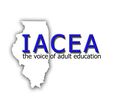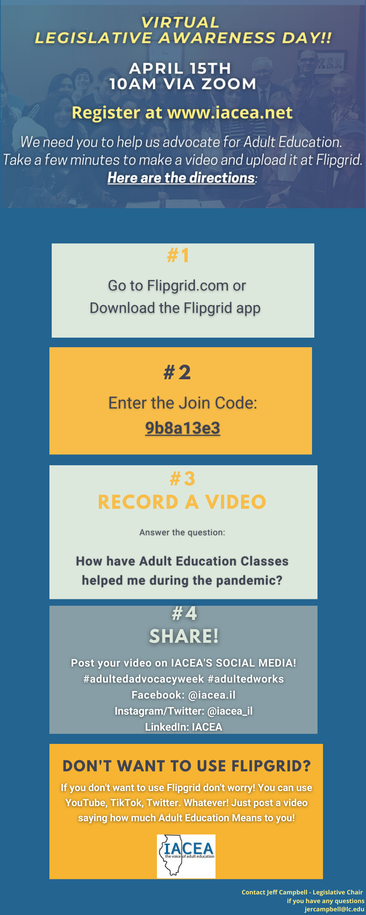2021 Virtual Legislative Awareness Day
Featured SpeakersChristopher McElroy
IACEA President Bevan Gibson
SIPDC Director Beth Paoli
Literacy Program Specialist |
IACEA The Voice of Adult Education in Illinois is excited to sponsor our first Virtual Legislative Awareness Day, April 15th. As you know, the need for Adult Education programs and services is at an all-time high. Our students need additional support and any cut in funding will have long-term effects on them. We urge you to involve students, staff, and volunteers in a virtual meeting with your legislators during the week of April 12th. There are two ways to participate in this year’s event. 2.You can also show your support by uploading a video to be viewed by the other event participants. The instructions for uploading the video are below. We greatly appreciate your support. In order to learn more about what we do in adult education in Illinois and why it is important, please see the information. The point of the meeting will be to discuss the importance of Adult Education. The attached Talking Points can help you to develop your message. You can find your legislators using this website: https://www.elections.il.gov/ElectionOperations/DistrictLocator/AddressFinder.aspx Jeff Campbell our Legislative Chair is coordinating this event. If you have any questions or would like to know how you can participate further please contact him at [email protected] to let him know. Likewise, he can keep you updated in case of any changes along the way. We look forward to a strong, statewide participation the week of April 12th! Let’s make our voices heard! See you in cyberspace! Sincerely, Christopher McElroy, President IACEA – the Voice of Adult Education in Illinois |
Featured SpeakersJennifer Foster
Deputy Executive Director Kathy L. Olesen-Tracy
Senior Director for Adult Education and Literacy Jeff Campbell
Legislative Chair |
Advocacy Talking Points for Adult
Education
We urge you to join in our advocacy efforts, to tell the stories of our students, and to emphasize the unique and critical role Illinois Adult Education plays in educating Illinois families, communities, and our economy.
Let them know the following key points:
- State funding must be maintained in order to continue to receive federal funding.
- Adult Education is needed now more than ever – during this pandemic, our services become even more important as our learners are extremely vulnerable to the economic downturn from COVID-19 and therefore need extra support.
- Adult Education saves millions in reduced food stamp and Medicaid costs and adds more jobholders and taxpayers – it is virtually the only program in the state that consistently produces more in savings than what was invested.
- Many of our programs and learners do not have access to the technology needed to participate in distance learning. We need to upgrade software, hardware, and training to increase capacity.
- In FY 2019 ICCB funded adult education programs in Illinois provided services to 59,769 students. (Illinois Community College Board Report to the Governor and General Assembly) and Illinois State Library Literacy programs served 11,418 adult learners who read below the 9th grade level. (Guide to the Secretary of State Literacy Effort 2020)
Adult Education and Literacy WORKS by assisting Illinois residents:
- Achieve GED/high school equivalency
- Improve basic literacy skills
- Get a job and/or go to college achieving a higher standard of living
- Pay more taxes and make other fiscal contributions
- Increase success for the next generation as educated parents
- Have lower incarceration rates (saving $21,000/year average per person NOT in prison)
- Improve health and get healthcare
- Become voters
- Achieve higher rates of citizenship
- Volunteer and become engaged in their communities
There is much unmet need:
- More than 1.3 million of Illinois’ 12.7 million adults have less than 12 grades of formal education. Included in this number are close to 415,915 adults with less than a 9th grade education.
- Approximately 2.8 million adults speak a language other than English as the primary language in their home. English literacy skills for the entry and advancement in the labor force are needed by many of these residents.
Do you think adult education is important?
Do you value your work and the work of others in the field?
If you do, then now is the time to stand up for ADULT EDUCATION and for our students.
Do you value your work and the work of others in the field?
If you do, then now is the time to stand up for ADULT EDUCATION and for our students.







